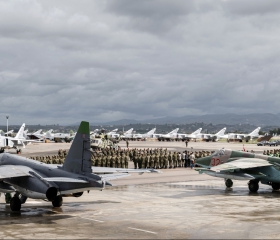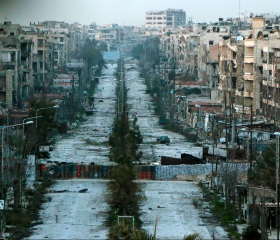On August 15, 2016 Russian aircraft arrived at the Iranian air base Hamadan and the following day flew first combat missions, bombing Islamic State and Jabhat An-Nusra (now Jabhat Fateh ash-Sham) targets in the Syrian provinces of Aleppo and Deir Ezzor. Since then Russia has intensified bombings of terrorist targets including three launches of Kalibr cruise missile from the Mediterranean on Aug. 19.
Just six days after that, on August, 22 Iranian Defense Minister reported that Russia stopped using Hamadan air base in Iran. In addition, Defense Minister of Iran Hossein Dehghan criticized Russia for the “kind of show-off and ungentleman” way it publicized the deployment of its bombers in Iran. Shortly after that Russian Defense Ministry released the statement saying that all aircraft stationed in Hamadan airbase successfully completed their mission and returned to Russia. Thus, Russian aircraft were using Hamadan air base and performed strikes against terrorist targets in Syria just for six days.
As such move came against the Turkish reconciliation with Israel and Russia, improvement of Ankara’s relations with Iran, and growing Turkey’s tensions with the West (although after U.S. Vice President Joseph Biden’s visit to Ankara on August, 24 and Turkey’s de-facto intervention in Syria the same day, tensions between the two look less worrying), it brought some important changes in the regional power balance and dynamic.
Abrupt withdrawal
Together with the Iranian announcement of Russian bombers leaving Hamadan air base, Tehran criticized Moscow for the way it publicized the deployment of bombers in Iran and called it an attempt “to show they are a superpower to guarantee their share in political future of Syria...”
Such reaction comes just a day after Iran’s Defense Minister actually praised Russia’s use of Hamadan air base in their common fight against terrorism in Syria. Besides, during the past week Iranian officials defended Russia’s use of Hamadan air base in their country’s parliament and explained to those concerned that it was a temporary and mutually beneficial decision. It seems that Tehran used such rhetoric to restore its image (both domestically and internationally) after decision to allow Russian aircraft access to Hamadan was criticized by conservative circles in Iranian establishment.
However, the real message of such “six-days agreement” on Russia’s access to Iranian air base was to showcase a new depth of Russia-Iran military cooperation and demonstrate Moscow’s increased capabilities in its operations in the Middle East.
This is why future usage of Iranian air bases or other military infrastructure by Russian aircraft should not be excluded.
Behind the deployment
It looks like the final decision to deploy Russian bombers in Hamadan was made during Putin-Rouhani personal meeting in Baku on 8 August, 2016. However, Iranian Defense Ministry officially explained access of Russian bombers to the Iranian Hamadan air base just four days after the first reports appeared on August, 15. During the past week some part of the Iranian establishment and parliament expressed disagreement with such move, so Iranian officials (parliament speaker Ali Larijani, the head of parliament’s National Security and Foreign Policy Commission Alaeddin Boroujerdi) defended and clarified Russian use of Hamadan air base. Basically Iran’s decision to allow Russia to use its airbase was not unanimously welcomed there and required some time to sell out the deal.
Thus, Iranian Defense Minister Hossein Dehghan announced Iran’s official position Iran on August, 20: “Reception of Russian aircraft at the airbase in Hamadan is carried out in the framework of mutual cooperation and the fight against terrorism at the request of the Syrian government.” He further underlined that Russia is allowed to use the air base as long as the necessity exists an also did not exclude Iran providing Russia with an access to more of its air bases if needed.
So, Tehran’s initial line was to let Russian bombers stay in Iran for an unspecified period with possible extension of bases they can use.
It definitely underlines deepening military cooperation between Russia and Iran and sends a signal to everyone who doubted Russia-Iran partnership on regional issues like Syria.
Russia’s benefits
Firstly, deployment of the Russian bombers at Iranian air base reduces flying time to targets by 60% which allows more flexibility for strikes and their higher intensity. According to Russian military experts, this increases the effectiveness of the long-distance flights at least threefold, allowing each Tu-22M3 bomber to carry about 20 tons of warheads and to hit four-five targets for each flight. This indicates a new, more active stage of fighting the ISIS and Jabhat al-Nusra in East of Syria and around Aleppo. As a strategic battle for Aleppo is still ongoing, Russian air support can provide crucial advantage to the Syrian government forces.
By deploying its bombers to Iran Moscow on the one hand reinforced Tehran by the fact that Russia’s air force is present on its soil as it ties Iran closer to Russia in military cooperation in the region, strengthens its position in the region and improves its immunity to military action. On the other hand, it gave Russia a certain leverage over Iran as Russia takes certain responsibility for Iran’s behavior in the region.
This decision might well be a signal to the West that Russia and Iran stick together in their stance on Syria, demonstrating the unity between Moscow and Tehran and a new level of their military cooperation. Iranian officials also said that Tehran is ready to provide Russia with all necessary infrastructure to fight terrorists in Syria. It creates a good basis for further advancement of Russia-Iran military cooperation and can potentially lead to further “experiments” with giving Russian military access to its infrastructure.
However, let’s not forget that Russia and Iran have certain disagreements on Syria, namely the figure of Assad, and degree of possible compromise with the West and the rebels it backs. Thus, increasing military cooperation between Russia and Iran now does not exclude its decline later once the strategic aims of both sides more or less achieved or affected by change in regional dynamics.
Regional implications
The bottom line of Iran’s decision to allow Russia to station its bomber jets on its soil was to strengthen its positions against the U.S.-led regional alliance and in particular against its regional adversaries, Israel and Saudi Arabia. Thus, the signal was sent.
Most certainly, Israel was aware of the Russia-Iran decision because all important decisions dealing with Iran are of direct business for Israel. Russian deliveries of S-300 air defense systems to Iran also worried Israel, so it required Moscow to give Tel Aviv certain guarantees that it does not threaten Israeli security. Also given Russia-Israel extensive military-intelligence cooperation, Israel was most certainly aware of Russia-Iran agreement. It should not be forgotten that Russia also coordinated with Israel before deploying jets to Syria in September, 2015. Frequent Putin-Netanyahu personal meetings (four since September, 2015) and phone talks (10 calls in 2015) demonstrate intensity of the dialog between the two countries.
As for Saudi Arabia, its reaction is muted for now, but most likely it will go in line with that of the U.S. So far Washington has expressed quite restrained reaction, describing the Russian move as “unfortunate but not surprising.”
In the light of the recent Russia-Turkey rapprochement, it is most likely that Ankara was informed about Russia’s move during Erdogan’s visit to St. Petersburg. It generally falls in line with the Russia-Turkey reconciliation and readiness to set up anti-terror cooperation. On the top of that, unverified reports appeared that the U.S. may be moving its nuclear weapons from Turkish Incirlik airbase to Romania while a Russian official suggested that Turkey could provide Incirlik for Russian jets operating in Syria. That would completely change regional dynamics.
Thus, Russian bombers in Iran come at little surprise for the regional and global actors, meaning that coordination between all major actors involved (which majorly goes unseen for the public) does exist, which gives a hope for the better.
Turkey’s intervention in Syria: A game changer?
Ankara’s recent move to intervene directly in Syria brings more complexity to the Syrian conflict, although the amount of variables in the equation stays the same. What we actually see is that Turkey was finally granted a permission to establish its zone of influence in Syria along Turkish-Syrian border, which Ankara was dreaming about since 2012. After Turkey downed the Russian jet in November 2015, Russia deployed its state of the art S-400 air defense systems to Hmeymim airbase in Syria, which de-facto established an effective no-fly zone over much of the Syrian territory. That sent a clear signal to Ankara that its jets in Syrian skies would not be tolerated.
Exactly because of that, Turkey’s offensive on Jarablus is very indicative. It was preceded by preliminary airstrikes on the city by Turkish and other U.S.-led coalition jets. That means that that Turkish F-16s entered the Syrian skies for the first time since Russia had deployed the S-400 in November, 2015. It essentially indicates that Russia granted Turkey an exemption from its no-fly zone in certain areas which means Putin and Erdogan agreed on some trade-offs in Syria and Moscow gave a green light to Ankara. Otherwise, Turkey would not have launched operation “Euphrates Shield,” also given ongoing Russia-Turkey reconciliation and intensified military-intelligence ties between the two. In exchange Ankara might have agreed to be more cooperative on political track with Assad. This is why, it wouldn’t be fair to say that Russia had no idea of Turkish plans and that it goes against its interests.
It should not be forgotten that the absolute priority for Ankara is to prevent Syrian Kurds from taking control over the border with Turkey, not letting them to establish an area under their control from Afrin to Qamishli (about 70 per cent of the Syrian border with Turkey). By getting into Syria Turkey prevents the very idea of de-facto Kurdish-state in north of the country (following the model of Iraqi Kurdistan). This actually suits Russia, Iran and Syria. However, a main drawback of such development is intensification of the conflict between Syrian Kurds, represented by Syrian Democratic Forces (SDF), and Turkey-backed militants.
Intervening in Syria, Erdogan said the operation is also against Kurdish militia (apart from being against ISIS), whom Ankara views as a branch of Kurdish Workers’ Party (PKK) which is labeled as a terrorist organization in Turkey. This, in fact, put Turkey-U.S. relations at bigger risk as Washington bet on Kurds as the most efficient force to fight terrorists in Syria and provides them military and financial assistance. Besides, Ankara’s military offensive in Syria coincided with the visit of the U.S. Vice President Joseph Biden to Turkey. During his visit Biden basically supported Turkish move and gave an ultimatum to Kurds, to withdraw to the East of Euphrates, otherwise U.S. will cease its support to them. That will potentially become a huge problem in the U.S. relations with Syrian Kurds.
Therefore, it is also not fair to say that Turkish offensive in Syria goes against Russian interests. Russia maintains ties with both Turkey and Syrian Kurds and unlike the U.S., did not invest that much in Kurds which allowing itself more room for maneuver. Moreover, there were reports that many militants flocked to Jarablus which almost stopped their advances in Aleppo, making it easier for Russia and Syrian Arab Army to make progress, including recently launched humanitarian operation.
Thus it would be premature to talk about new tensions between Russia and Turkey, or overall worsening of the situation in Syria after the Turkish move. In fact, for the first time in years almost all key players of the Syrian crisis (Russia, Iran, Turkey, Syria, with U.S. to a lesser extent) have something that unifies them other than fight against terrorism – unity of Syria through not getting Kurds an opportunity for an autonomy. It is not that bad of a start at all.


.jpg)




